The President of India (Articles 52-62) | Indian Polity for UPSC CSE PDF Download
President of India
The President of India is the head of state of the Republic of India. The President is the formal head of the executive, legislature, and judiciary of India and is also the commander-in-chief of the Indian Armed Forces.
Part V of the Constitution (The Union) under Chapter I (The Executive) lists out the qualification, election, and impeachment of the President of India.
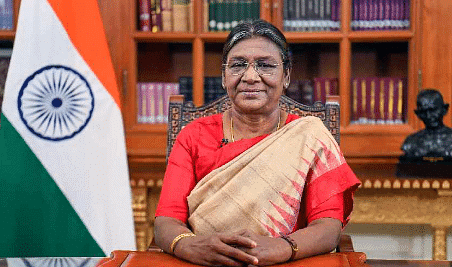
Although Article 53 of the Constitution of India states that the President can exercise his or her powers directly or by subordinate authority, with few exceptions, all of the executive authority vested in the President are, in practice, exercised by the Council of Ministers (CoM).
Part V The Union
Chapter I The Executive
Article 52: The President of India
There shall be a President of India.
Article 53: Executive Power of The Union
(i) The executive power of the Union shall be vested in the President and shall be exercised by him either directly or through officers subordinate to him in accordance with this Constitution.
(ii) Without prejudice to the generality of the foregoing provision, the supreme command of the Defence Forces of the Union Shall be vested in the President and the exercise thereof shall be regulated by law.
(iii) Nothing in this article shall –
- Be deemed to transfer to the President any functions conferred by any existing law on the Government of any State or other authority; or
- Prevent Parliament from conferring by law functions on authorities other than the President.
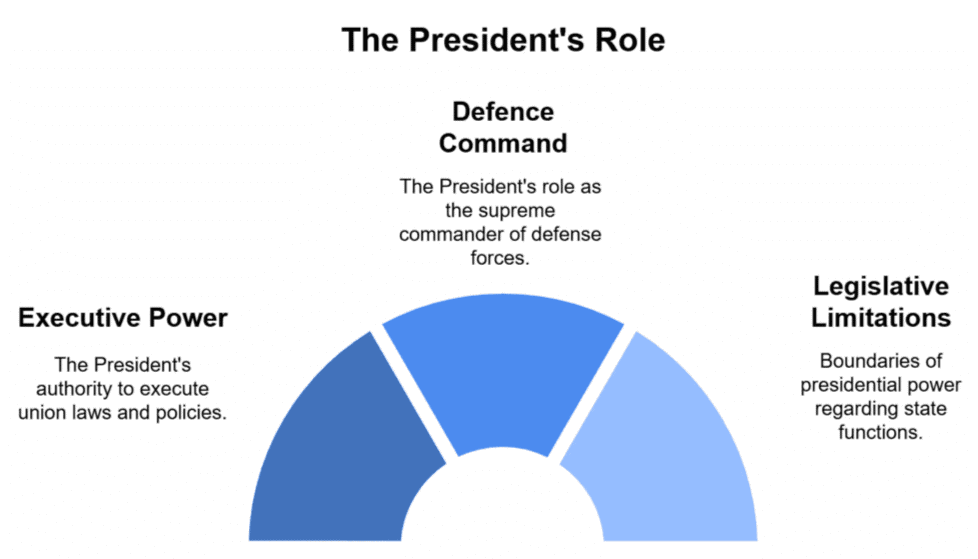
Article 54: Election of President
The President shall be elected by the members of an electoral college consisting of –
- The elected members of both Houses of Parliament; and
- The elected members of the Legislative Assemblies of the States.
Explanation: In this article and in article 55, “State” includes the National Capital Territory of Delhi and the Union territory of Pondicherry.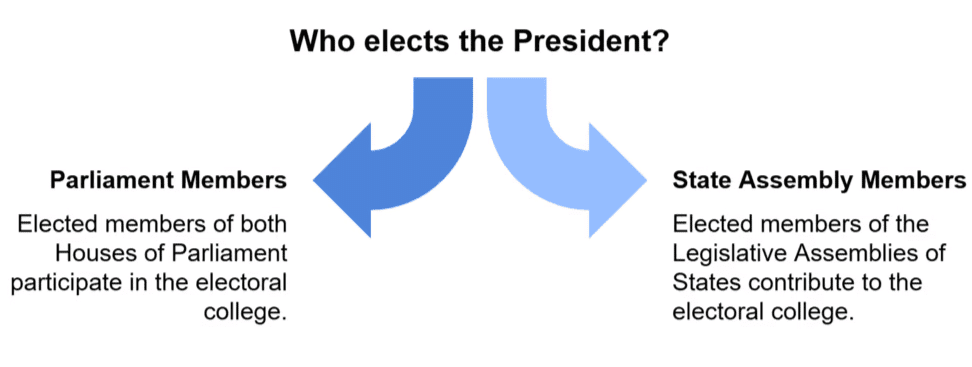
Article 55: Manner of Election of President
(i) As far as practicable, there shall be uniformity in the scale of representation of the different States at the election of the President.
(ii) For the purpose of securing such uniformity among the States inter se as well as parity between the States as a whole and the Union, the number of votes which each elected member of Parliament and of the Legislative Assembly of each state is entitled to cast at such election shall be determined in the following manner; –
- Every elected member of the Legislative Assembly of a State shall have as many votes as there are multiples of one thousand in the quotient obtained by dividing the population of the State by the total number of the elected members of the Assembly;
- If, after taking the said multiples of one thousand, the remainder is not less than five hundred, then the vote of each member referred to in sub-clause (a) shall be further increased by one;
- Each elected member of either House of Parliament shall have such number of votes as may be obtained by dividing the total number of votes assigned to the members of the Legislative Assemblies of the States under sub-clauses (a) and (b) by the total number of the elected members of both Houses of Parliament, fractions exceeding one-half being counted as one and other fractions being disregarded.
(iii) The election of the President shall be held in accordance with the system of proportional representation by means of the single transferable vote and the voting at such election shall be by secret ballot.
Explanation: In this article, the expression “population” means the population as ascertained at the last preceding census of which the relevant figures have been published:
Provided that the reference in this Explanation to the last preceding census of which the relevant figures have been published shall, until the relevant figures for the first census taken after the year 2000 have been published, be construed as a reference to the 1971 census.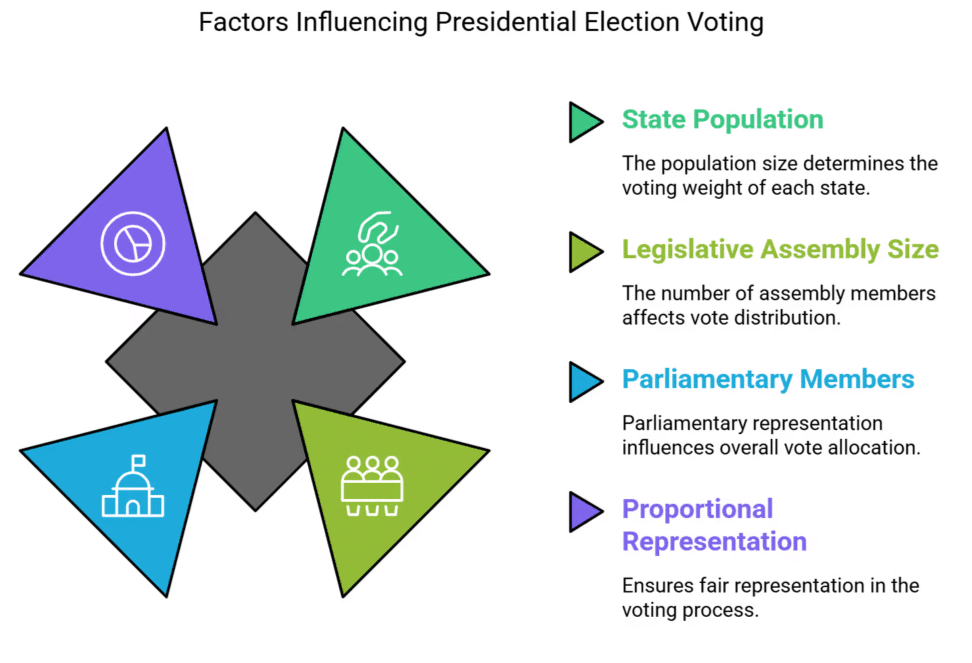
Article 56: Term of Office of President
(i) The President shall hold office for a term of five years from the date on which he enters upon his office:
Provided that –
- The President may, by writing under his hand addressed to the Vice-President, resign his office;
- The President may, for violation of the Constitution, be removed from office by impeachment in the manner provided in article 61.
- The President shall, notwithstanding the expiration of his term, continue to hold office until his successor enters upon his office.
(ii) Any resignation addressed to the Vice-President under clause (a) of the proviso to clause (1) shall forthwith be communicated by him to the Speaker of the House of the People.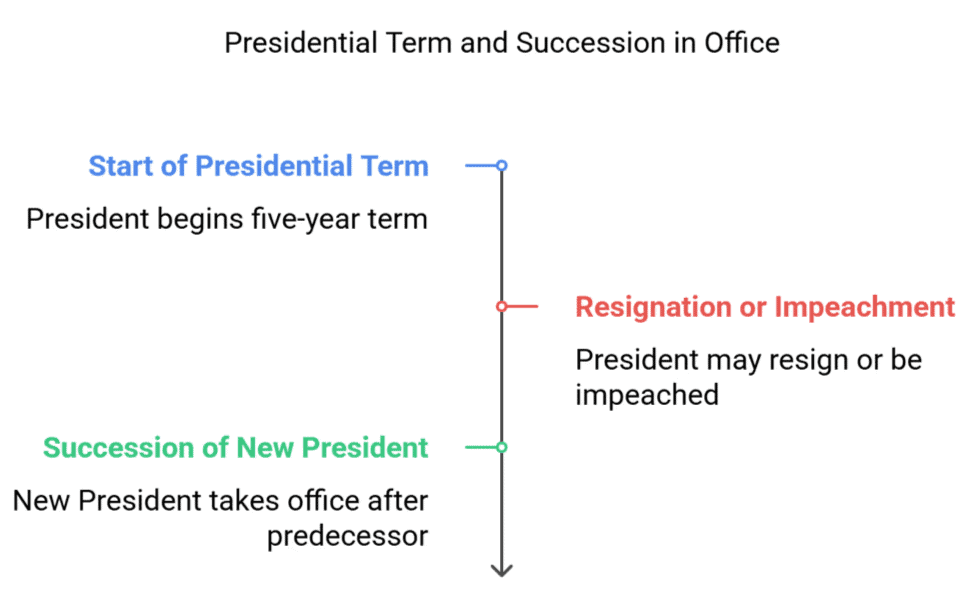
Article 57: Eligibility for Re-Election
A person who holds, or who has held, office as President shall, subject to the other provisions of this Constitution be eligible for re-election to that office.
Article 58: Qualifications for Election as President
(i) No person shall be eligible for election as President unless he –
- Is a citizen of India;
- Has completed the age of thirty-five years, and
- Is qualified for election as a member of the House of the People.
(ii) A person shall not be eligible for election as President if he holds any office of profit under the Government of India or the Government of any State or under any local or other authority subject to the control of any of the said Governments.
Explanation: For the purposes of this article, a person shall not be deemed to hold any office of profit by reason only that he is the President or Vice-President of the Union or the Governor of any State or is a Minister either for the Union or for any State.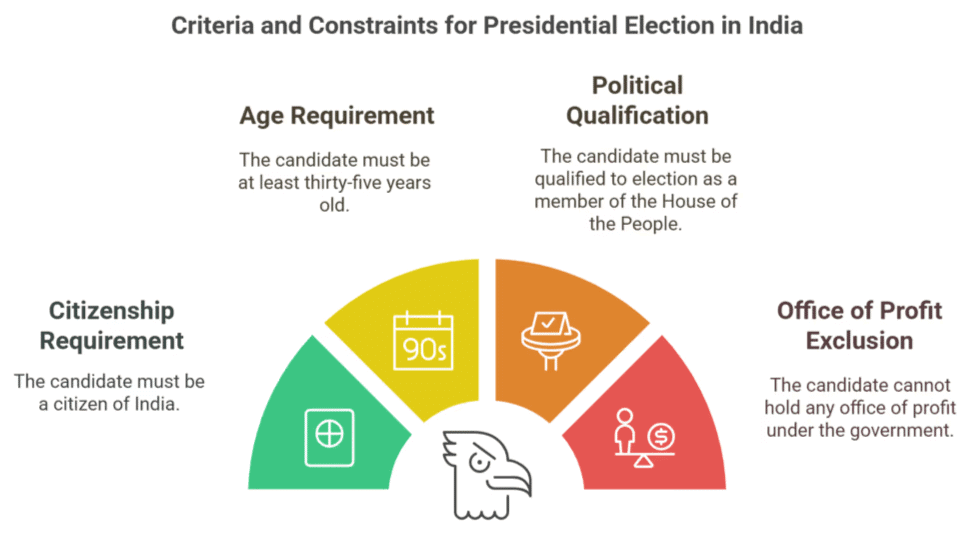
Article 59: Conditions of President’s Office
(i) The President shall not be a member of either House of Parliament or of a House of the Legislature of any State, and if a member of either House of Parliament or of a House of the Legislature of any State be elected President, he shall be deemed to have vacated his seat in that House on the date on which he enters upon his office as President.
(ii) The President shall not hold any other office of profit.
(iii) The President shall be entitled without payment of rent to the use of his official residences and shall be also entitled to such emoluments, allowances and privileges as may be determined by Parliament by law and until provision in that behalf is so made, such emoluments, allowances and privileges as are specified in the Second Schedule.
(iv) The emoluments and allowances of the President shall not be diminished during his term of office.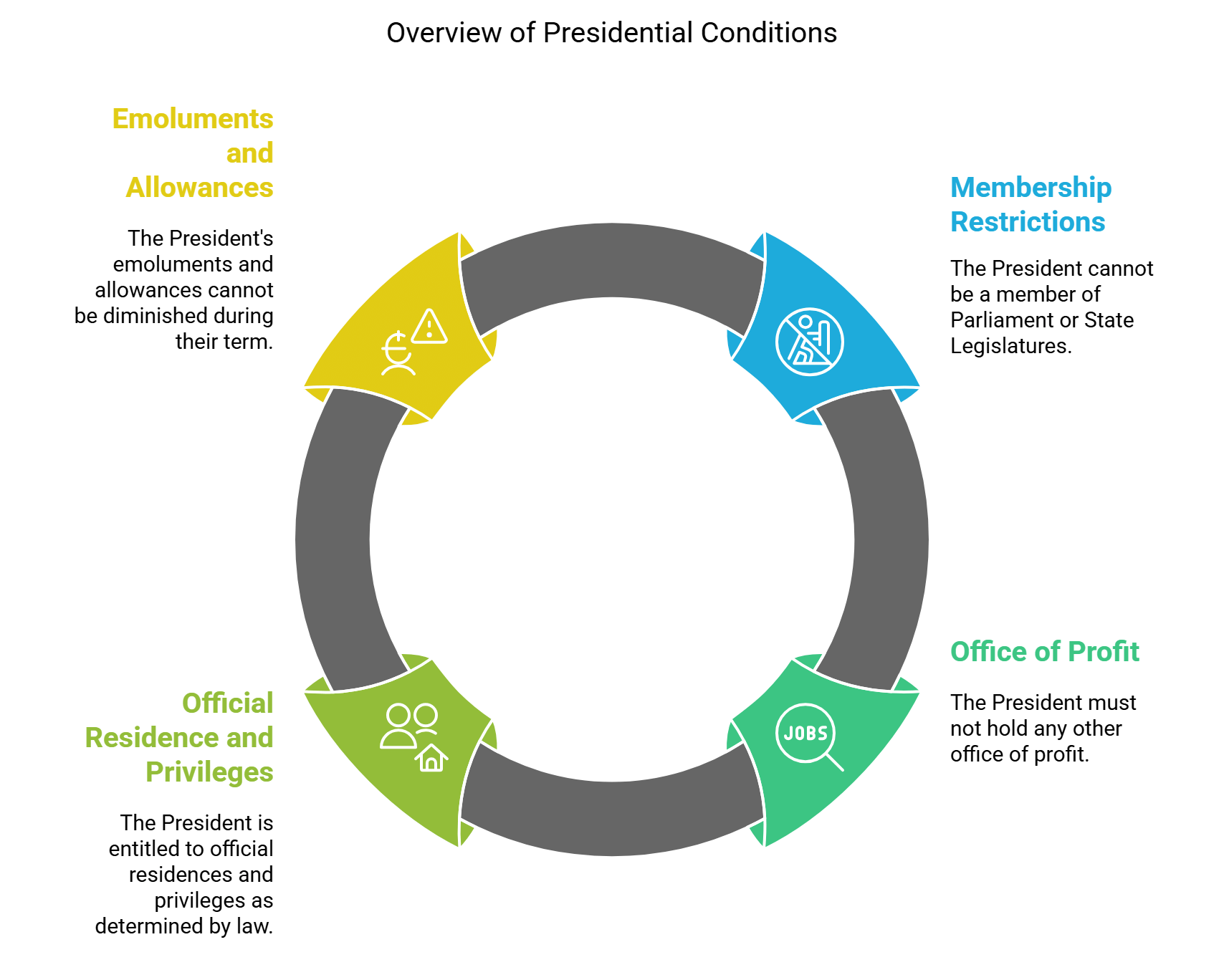
Article 60: Oath or Affirmation by The President
Every President and every person acting as President or discharging the functions of the President shall, before entering upon his office, make and subscribe in the presence of the Chief Justice of India or, in his absence, the senior most Judge of the Supreme Court available, an oath or affirmation in the following form, that is to say – “I, A.B., do swear in the name of God / solemnly affirm that I will faithfully execute the office of President (or discharge the function of the President) of India and will to the best of my ability preserve, protect and defend the Constitution and the law and that I will devote myself to the service and well-being of the people of India.”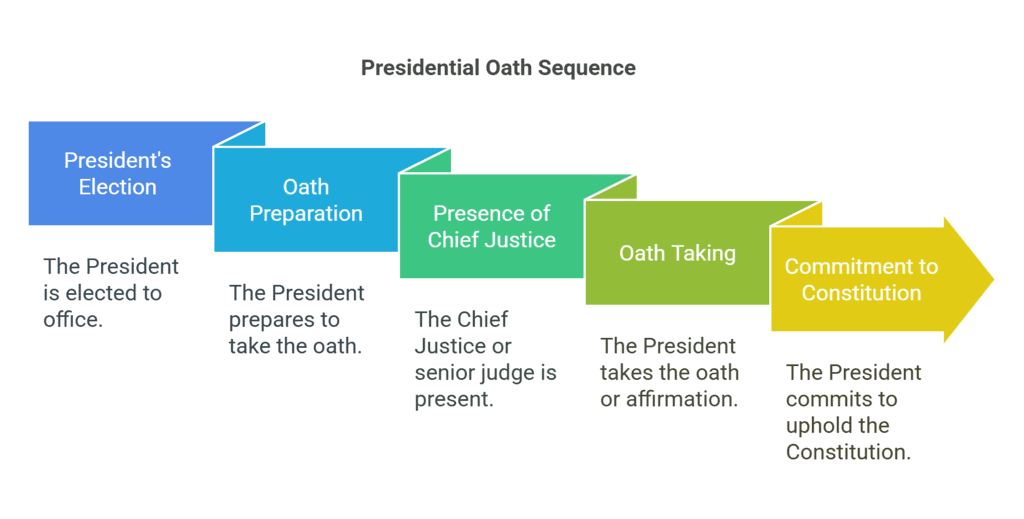
Article 61: Procedure for Impeachment of The President
(i) When a President is to be impeached for violation of the Constitution, the charge shall be preferred by either House of Parliament.
(ii) No such charge shall be preferred unless –
- The proposal to prefer such charge is contained in a resolution which has been moved after at least fourteen days’ notice in writing signed by not less than one-fourth of the total number of members of the House has been given of their intention to move the resolution, and
- Such resolution has been passed by a majority of not less than two-thirds of the total membership of the House.
(iii) When a charge has been so preferred by either House of Parliament, the other House shall investigate the charge or cause the charge to be investigated and the President shall have the right to appear and to be represented at such investigation.
(iv) If as a result of the investigation a resolution is passed by a majority of not less than two-thirds of the total membership of the House by which the charge was investigated or caused to be investigated, declaring that the charge preferred against the President has been sustained, such resolution shall have the effect of removing the President from his office as from the date on which the resolution is so passed.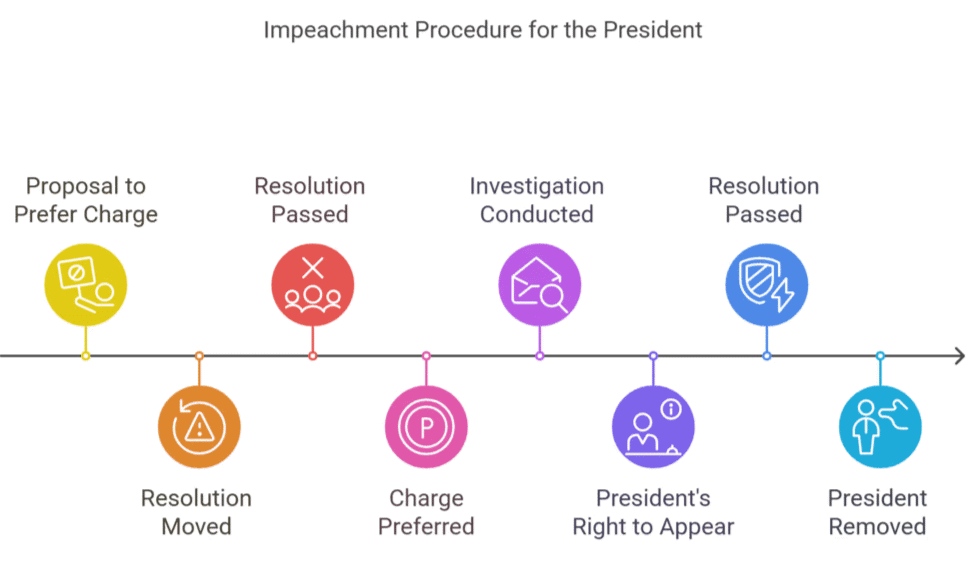
Article 62: Time of Holding Election to Fill Vacancy in The Office of President and The Term of Office or Person Elected to Fill Casual Vacancy
- An election to fill a vacancy caused by the expiration of the term of office of President shall be completed before the expiration of the term.
- An election to fill a vacancy in the office of President occurring by reason of his death, resignation or removal, or otherwise shall be held as soon as possible after, and in no case later than six months from, the date of occurrence of the vacancy; and the person elected to fill the vacancy shall, subject to the provisions of article 56, be entitled to hold office for the full term of five years from the date on which he enters upon his office.
Info-Bits Related to the President of India
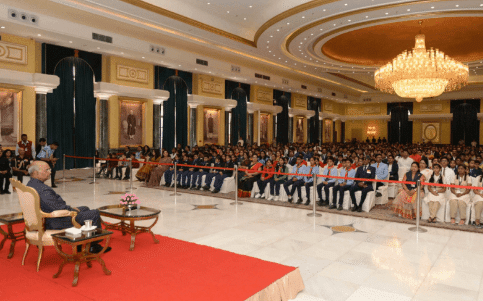
- The salary of the Indian President is Rs.5 lakh. Until 2017, the President used to get Rs 1.50 lakh per month. In Budget 2018, it was increased to Rs 5 lakh per month.
- In addition to the salary, the President receives many other allowances and free facilities which include free medical, housing, and treatment facilities (whole life).
- The Government of India spends around Rs.2.25 crore rupees annually on other expenses like President’s housing, staff, food and hosting of guests.
- Indian President’s salary is 7000$*12=84,000$, which is much lower when compared to US President’s salary of 4,00,000$.
- The president of the United States of America is also indirectly elected by the people through the Electoral College, but to a four-year term. He is one of only two nationally elected federal officers, the other being the Vice President of the United States. (In total, there are 538 electors, corresponding to the 435 members of the House of Representatives, 100 senators, and the three additional electors from the District of Columbia.)
- Under The Presidential and Vice-Presidential Elections Act, 1952, a candidate, to be nominated for the office of president of India needs 50 electors as proposers and 50 electors as seconders for his or her name to appear on the ballot.
- The general principle in Indian Presidential election is that the total number of votes cast by Members of Parliament equals the total number of votes cast by State Legislators.
- There are a total of 776 voters in both the Houses of Parliament. The Electoral College also consisted of 4120 MLAs in the states.
- The formula to determine the value of the vote of an MLA = Population of the state ÷ (No. of M.L.A.s in the state X 1000).
- The formula to determine the value of the vote of an MP = Total value votes assigned to all the M.L.A.s ÷ Total number of MPs.
- Each MP had a vote value of 708 in the Presidential Election 2012.
- Legislators from larger states cast more votes than those from smaller states.
- If a state has few legislators, then each legislator has more votes; if a state has many legislators, then each legislator has fewer votes.
- JFYI: The President of India moves around in a custom built heavily armoured Mercedes Benz S600 Pullman Guard (which costs around Rs. 12 Crore).
- Nominated members cannot vote in the Presidential election. But they can participate in President’s impeachment.
- PS: Nominated members can participate in Vice-President’s election and removal.
- MLAs are involved in the Presidential election, but they have no role in President’s impeachment. President’s impeachment resolution requires a special majority of both houses of the parliament to pass.
Powers of Indian President
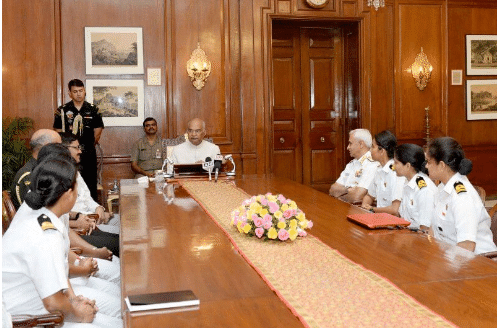
Powers of Indian President can be broadly classified under 8 headings. They are :
- Legislative
- Executive or Appointment powers
- Judicial powers
- Financial powers
- Diplomatic powers
- Military powers
- Pardoning Powers
- Emergency powers
There are articles outside Chapter 1 of Part V related with powers of President of India like Article 72 and Articles 352-360. We shall discuss in detail each of them later.
Article 72: Power of President to grant pardons, etc., and to suspend, remit or commute sentences in certain cases
(i) The President shall have the power to grant pardons, reprieves, respites or remissions of punishment or to suspend, remit or commute the sentence of any persons convicted of any offence –
- In all cases where the punishment of sentence is by a Court Martial;
- In all cases where the punishment or sentence is for an offence against any law relating to a matter to which the executive power of the Union extends;
- In all cases where the sentence is a sentence of death.
(ii) Nothing in sub-clause (a) of clause (1) shall affect the power conferred by law on any officer of the Armed Forces of the Union to suspend, remit or commute a sentence passed by a Court martial.
(iii) Nothing in sub-clause (c) of clause (1) shall affect the power to suspend, remit or commute a sentence of death exercisable by the Governor of a State under any law for the time being in force.
|
170 videos|999 docs|259 tests
|
FAQs on The President of India (Articles 52-62) - Indian Polity for UPSC CSE
| 1. What is the role of the President of India? |  |
| 2. How is the President of India elected? |  |
| 3. Can the President of India be removed from office? |  |
| 4. What are the qualifications required to be eligible for the position of President of India? |  |
| 5. What are the powers and functions of the President of India? |  |

















